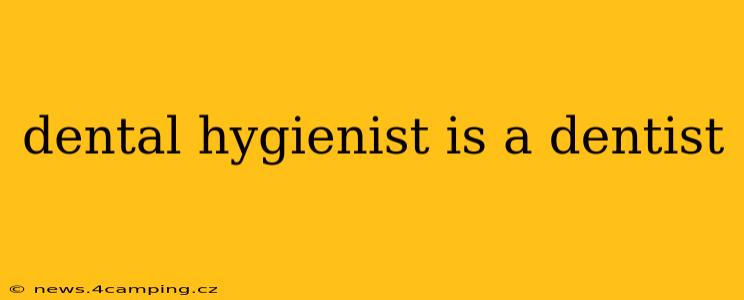Dental Hygienist vs. Dentist: What's the Difference?
The question "Is a dental hygienist a dentist?" is a common one, and the answer is a simple, definitive no. While both dental hygienists and dentists work in the dental field and collaborate closely, their roles, training, and responsibilities are distinctly different. Understanding these differences is crucial for patients seeking optimal oral health.
This article will clarify the distinctions between these two important dental professionals, addressing frequently asked questions to provide a comprehensive understanding of their respective roles.
What does a dentist do?
Dentists are medical professionals who have completed extensive education and training, earning a Doctor of Dental Surgery (DDS) or Doctor of Dental Medicine (DMD) degree. Their responsibilities encompass a wide range of services, including:
- Diagnosis and treatment of oral diseases: This includes identifying and treating conditions like cavities, gum disease (periodontitis), oral cancer, and temporomandibular joint (TMJ) disorders.
- Performing complex dental procedures: Dentists conduct procedures such as extractions, root canals, fillings, crowns, bridges, and implants. They also oversee more intricate procedures like orthodontics (braces) and oral surgery.
- Developing and implementing treatment plans: Dentists create individualized treatment plans based on a patient's specific needs and overall health.
- Preventing oral diseases: They provide education and guidance on maintaining good oral hygiene practices to prevent future problems.
- Prescribing medications: Dentists can prescribe medications for various oral health issues, such as antibiotics for infections.
What does a dental hygienist do?
Dental hygienists are licensed healthcare professionals who work as part of the dental team, focusing on preventative care and oral hygiene. Their educational background typically involves an associate's or bachelor's degree in dental hygiene. Key responsibilities include:
- Providing preventative care: This is their primary role, encompassing cleaning teeth, removing plaque and tartar, and polishing teeth to remove surface stains.
- Educating patients on oral hygiene: Dental hygienists teach patients about proper brushing, flossing techniques, and other habits that contribute to good oral health. They also provide guidance on diet and lifestyle choices that impact oral health.
- Detecting early signs of oral diseases: During cleanings, dental hygienists carefully examine the mouth for signs of cavities, gum disease, oral cancer, and other issues. They report their findings to the dentist for further evaluation and treatment.
- Applying fluoride treatments: They often apply fluoride treatments to strengthen tooth enamel and prevent cavities.
- Taking X-rays (in some jurisdictions): Depending on their license and training, dental hygienists may be authorized to take dental X-rays under the supervision of a dentist.
Can a dental hygienist perform dental surgery?
No, dental hygienists are not trained or licensed to perform surgical procedures. Their scope of practice is focused on preventative care and the detection of oral diseases. Any surgical procedures or restorative work must be performed by a dentist.
What is the difference in education between a dentist and a dental hygienist?
The key difference lies in the educational path and scope of practice. Dentists complete a rigorous program leading to a DDS or DMD degree, requiring years of study and clinical training. Dental hygienists typically complete an associate's or bachelor's degree program in dental hygiene, with a strong focus on preventive care and oral hygiene. The training differences significantly impact the range of procedures each professional is qualified to perform.
What are the career paths for dental hygienists and dentists?
Both professions offer various career paths. Dentists may choose to open their own practices, work in hospitals, clinics, or specialize in areas like orthodontics, periodontics, or oral surgery. Dental hygienists can work in private dental practices, public health clinics, schools, or corporate settings. Some hygienists choose to specialize in areas such as periodontal therapy or public health dentistry.
In conclusion, while both dentists and dental hygienists are essential members of the dental healthcare team, their roles, training, and responsibilities are quite different. Dentists provide comprehensive dental care, including diagnosis, treatment, and surgical procedures, while dental hygienists focus on preventative care, oral hygiene education, and early detection of oral diseases. Understanding this distinction allows patients to receive the most appropriate and effective dental care.
